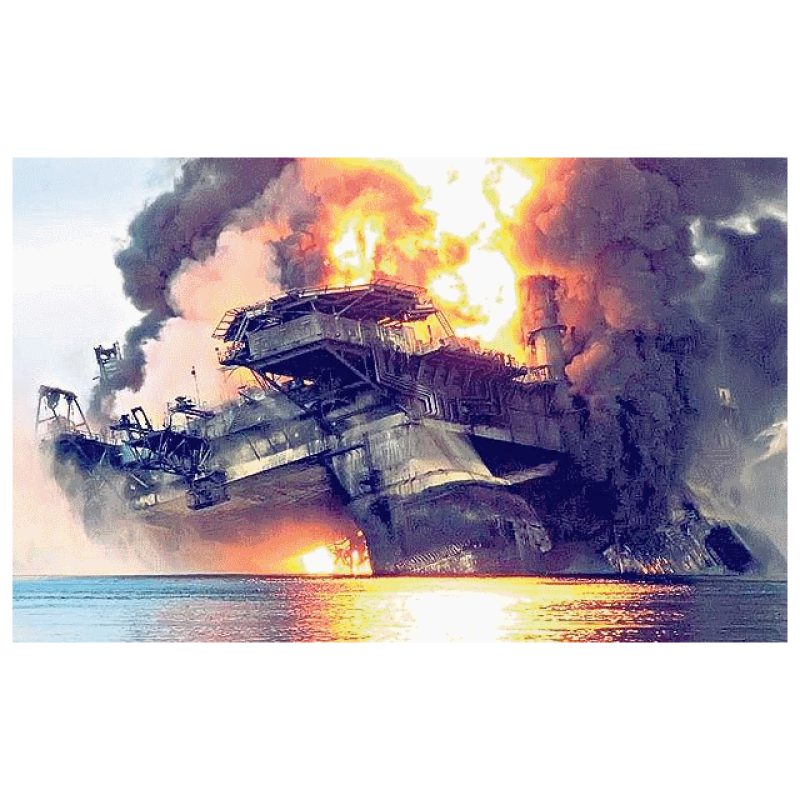Deepwater Horizon led to new protections for US waters. Trump just repealed them.


The Deepwater Horizon offshore drilling rig exploded on April 20, 2010, killing 11 workers. Gas erupted into a massive fireball, and then the rig gushed 4.9 million barrels of crude oil into the Gulf of Mexico. It soon became the largest and most expensive marine oil spill in history, with an estimated $17.2 billion in damages to properties, fisheries, and tourism across the Gulf Coast.

that imposed regulations on offshore drilling after the 2010 Deepwater Horizon oil spill.
US Coast Guard
In response, President Barack Obama signed an executive order creating a commission to study the spill. The commission recommended new safety rules, accountability standards, and environmental regulations for drilling in US waters. Obama then signed another executive order to promote environmental stewardship of the ocean, coasts, and the Great Lakes in light of the oil spill. According to the Bureau of Ocean Energy Management , the new rules were “the most aggressive and comprehensive reforms to offshore oil and gas regulation and oversight in U.S. history.”
On Tuesday, President Donald Trump revoked Obama’s stewardship directive , replacing it with a new executive order giving more responsibility to states for offshore oil and gas drilling, as well as prioritizing business interests ahead of the environment. Trump said the measure is “ rolling back excessive bureaucracy created by the previous administration .” (There was no mention of the Deepwater Horizon spill in his announcement or in the executive order.)
Rep. Rob Bishop (R-UT), who chairs the House Natural Resources Committee, said the order “puts our country’s ocean policy back on the right track.”
A former member of the Coast Guard who served during Deepwater Horizon was appalled:

House Natural Resources Committee ranking member Rep. Raul Grijalva (D-AZ) told the Associated Press the order was “unilaterally throwing out” years of environmental preservation efforts.
Perhaps most importantly, the order unravels coastal protection rules put in place to avoid future disasters like the Deepwater Horizon spill. The provisions limited where and how energy companies could drill, and the industry has been chafing at the regulations.
The new executive order is the oil industry’s wish come true
The Deepwater Horizon disaster showed that there were systemic failures in the offshore oil industry that came to a head on that day eight years ago. Oil major BP, which was leasing the rig, was pushing operators to work faster and had racked up hundreds of safety violations at the time of the explosion. The operator, Transocean , also made mistakes in reporting alerts and in interpreting critical data, highlighting poor training. And government regulators quickly approved last-minute changes to the well’s design shortly before it exploded.
The disaster also illustrated how ill-prepared coastal communities were for such a spill, and how vulnerable their economies were to such a traumatic event.
The Obama administration added new requirements and rules to reduce the risk of these factors aligning again. They strengthened the drilling permit review process, added stricter safety requirements, and forced companies to conduct better environmental reviews.
But in April 2017, Trump issued an executive order directing Interior Secretary Ryan Zinke to “ reconsider ” rules implemented after the Deepwater Horizon spill. This week’s executive order is the culmination of that effort.
Industry groups were elated at the prospect of undoing the changes. Environmental groups were aghast.

It’s unlikely that the new executive order will lead to more drilling right away, given that the United States already has abundant onshore oil and drilling in the water can be up to 20 times more expensive. But oil prices are rising , and lower safety requirements and weaker environmental protections would lower operating costs for coastal rigs. Activists are worried looser regulations would lead to more drilling and less safe operations, increasing the likelihood of another disaster.
The Interior Department is also presiding over the largest rollback of federal land protections in US history, opening up public lands to fossil fuel extraction and mineral mining. Plus, Secretary Zinke opened up nearly all coastal waters to drilling last year and started the process for the largest offshore lease sale ever.




MAGA!
I wonder how Trump plans on pinning the next oil spill on Obama.
Easy.
Just say, "It's Obama's fault." Fox News will repeat this "fact", and the Unthinking Faithful TM will believe...
"Donaltrawmp is getting rid of dem dere job killin' regalayshuns Ma, hooray for Donaltraaawwmp!"
Yes, allowing huge corporations to poison our environment is somehow a positive thing to the right wing dingbats.
Simple.
More money for the already-rich. The right serves the already-rich.
The Republican politicians? Sure, their motivation is obvious. What's harder to understand is the millions of people who get sucked in to thinking government regulations that protect the people from corporate abuses are a bad thing FOR the people.
The GOP tells the Unthinking Faithful TM that they will be protected from those people, in exchange for their surrendering everything. They joyously accept the offer.
I think that leaded paint should be provided to them at a deep discount, to make their corner of America great again.
Lol, they don't mind drinking leaded water, spreading leaded paint on their walls should not even cause them an afterthought!
This is pretty funny stuff actually. It was bush that repealed the safety regs that led to the Deepwater Horizon disaster in the first place. Pretty clear that once again, the GOP could care less about the environment, but is "all in" when it comes to supporting big oil.
Trump is a fucking retard...
But trump wants to make it EASIER for a disaster like this to happen again because a Black guy made it HARDER for disasters like this to happen.
This is a no-brainer twofer for Trump:
- He revokes the Black guy's heritage,
- He shovels tons of money to Big Oil!
What's not to love?
Ummmm... Did you read the definition?
O. M. G....
Funny how this comes up when the right wants to try to escape the racism tag. Ben Carson is only 80% black. See how that works?
Now, there's a word we don't see very often nowadays.
Do you also use "quadroon" and "octoroon"?